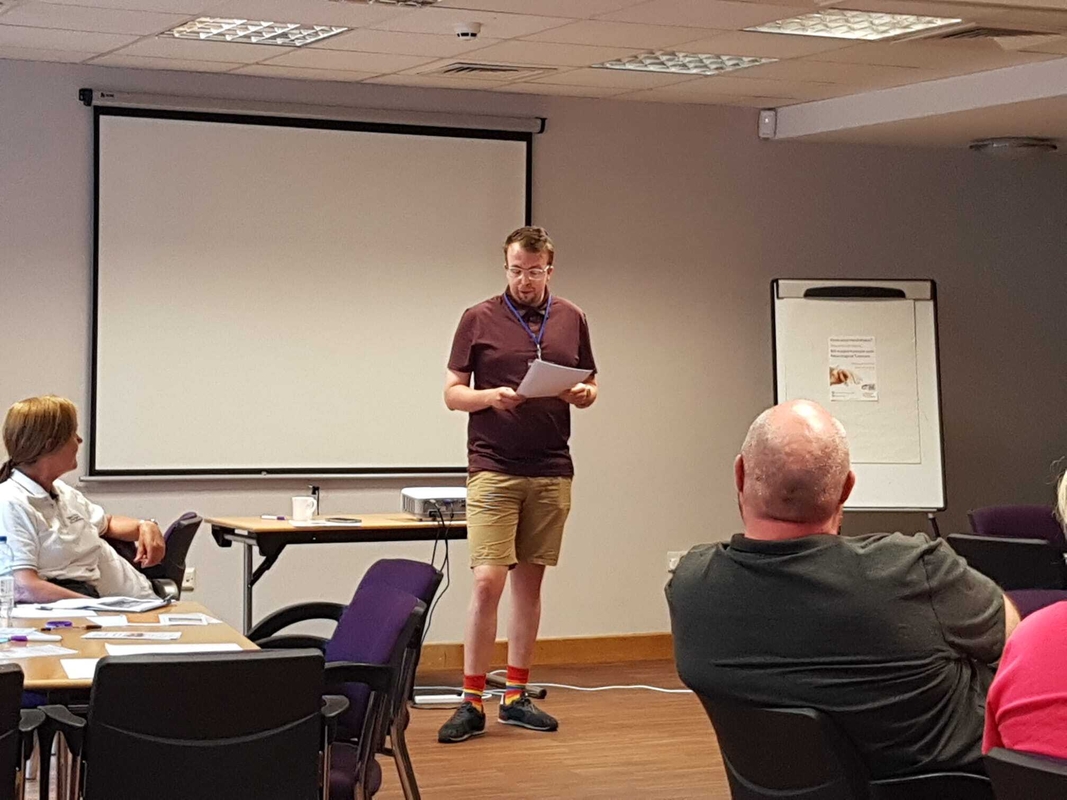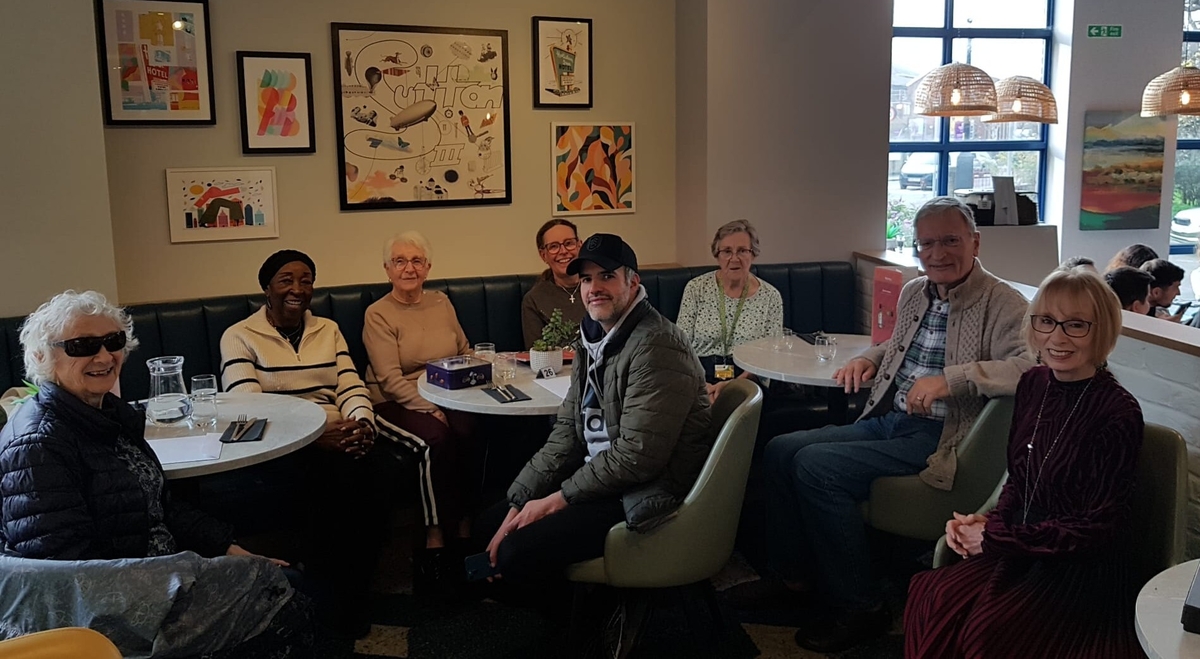A young adults perspective of Essential Tremor
NTF Young Adults Ambassador Anthony Murphy gave a wonderful speech sharing his own story of living with ET as a young adult at the Support Yourself and Support Others event held at Premier Inn, in Manchester on the 10 June 2023.
A young adults perspective of Essential Tremor - June 2023
Are you hungry? Are you thirsty? Are you cold? Are you nervous?
These are all questions that I am sure we have all heard.
No one is designed to shake. Especially young people. My personal experience is that people expect shaking to be an affliction for the older person and simply jump to the wrong conclusions.
It may sound like I am making a sweeping generalisation, but the odd looks and side eyes are too sweeping generalisations about the lifestyle that I lead.
I have shaken for at least the last 12 years. I certainly didn’t shake as a child, so something obviously went ary during the teen years.
I had always assumed that I was shaking because I was cold, hungry, tired, nervous but working with a nurse that I lived with, we systematically answered all those questions:
Tired? No. Still Shaking? Yes
Well fed? Yes. Still Shaking? Yes
Drank enough? Yes. Still Shaking? Yes.
Off to the doctors I went who sent me off for a neurologist referral – one 15-minute consultation. Some checks of reactions, then it was hold your hands out flat and off they go. Diagnosis of this condition called Benign Essential Tremor. Prescribed with 100mg Propranolol daily and away I went.
Thankfully, I am one of the fortunate ones where the medication has worked to control my tremors, and for the most part the tremors have been contained in my hands.
I have never seen a neurologist again after that, and I have only seen my GP once since my diagnosis to discuss my medication. The impact of the beta-blocking Propranolol on my heart rate meaning I was experiencing dizzy spells. A quick change over to Gabapentin and off we go again.
The questions I have found myself having since are-
Why me?
What does the future look like?
Why does no one seem to know about this?
For quite a few years, I dealt with Essential Tremor alone, not seeking out support or generally more information. All I knew was that it was progressive, medication helps, and brain surgery is the drastic option for a longer-term solution, and that there is no permanent cure. No magic pill. No ET wonderdrug!
Over the past couple of years, I have seen a few posts on mainstream platforms about Essential Tremor. Firstly, Rob Mallard’s great interview on This Morning.
And a segment on BBC One about Roger who went through DBS surgery and the impact it had on him. It was at this time I stuck my head above the parapet and shared my tremor for the first time because if we are ever to get acceptance or understanding, there is the need to put a hand up and say this is me!
By this point, I had found some support groups on Facebook including the National Tremor Foundation. I wanted to gain an insight of what the future looked like. The big unknown. As everyone progresses with ET differently, and some research has suggested that ET progresses differently in under and over 40s, there is always going to be a wide range of outcomes, but I wanted to know, needed to know the worst-case scenario. What did my life look like in 10,20,30, 40 years?
A quick peak down the rabbit hole found it wasn’t a rabbit hole to explore for a long time. Essential Tremor is a daily battle between the mind, body, and emotion to keep all three in balance. It is not productive or helpful to a positive mental state if you depress yourself with the great unknown.
Having Essential Tremor as a young adult, you need to have some abilities that will avoid you from falling into the great well of frustration and despair.
Number 1: Taking the bad days with the good.
You need to accept that bad days will happen. That whatever coping mechanisms you have to manage your tremor will not work and that it is just a crap day. Take it as a sign to take care of yourself, have a sofa day, and make the world wait for a day more.
Number 2: Don’t take yourself seriously
Accidents will happen. Drinks will be spilt. Fingers will hit the cheese grater or the wrong end of a knife. Accidents happen - it is how you deal with them that determines your experience with ET. Do you get frustrated, angry and upset every time something happens or do you roll with it? I’ve grated my fingers, I’ve nearly taken the top of my thumb off with a chef knife, I’ve dropped things. These things happen and you have to remember it’s not your fault.
Number 3: Accept who you are and crack on!
This one is tough and I think applies to us all. Shaking makes us feel vulnerable, broken, fragile. It makes us want to hide away and not be seen by anyone - we want to avoid the side-eyes, the looks, the whispered comments (or sometimes not so quiet judgement). Everyone’s journey is different - maybe I have found acceptance because for the majority of the time, I am a fully functional non-shaky 30-year-old adult - but when I have my jazz hands going on, I have come to a point where it is saying this is what it is. It is for them to deal with it. It is no one’s fault that we have Essential Tremor. It is not our fault there is no magic pill, and it is not our fault it is the minority who know about it.
Number 4: People will have questions.
Friends, family, colleagues, HR, the general public do not expect to find young people with an incurable neurological condition. This links into my previous tip. By having accepted the cards I have been dealt, I am able to be open up with people and answer their queries. What is it? Does it hurt? Is it annoying? Is there a cure?
By being able to answer questions, we spread acceptance and awareness with others. They may already be aware as a family member or friend has it. They may have never heard about it but it may be one more Google for them to find out more. One more person in the know
My hope is that the more people who know -- especially those who don’t have tremors --
The more awareness we have, the more chance (hopefully) we have of more research, a wider availability of successful, less invasive treatments, a happier prognosis. A cure would be amazing. Guaranteed management would do as a very good 2nd place.
Essential Tremor for me has had some perks. It has opened doors to new experiences, to speak to new people and to generally spread a message that there is this condition that impacts more people than Parkinsons, but yet is relatively unknown.
It has inspired me to climb the highest peaks in Great Britain. I have met amazing people and explored the opposite sides of the same Essential Tremor coin, I have walked the Brecon Beacons.
It has taught me to accept. It has pushed the boundaries of my resilience, my patience, my frustration. It has made me realise life is to be lived.
Being a progressive condition, I do not know what my later life is going to be like - therefore, it is imperative that I do what I can whilst it is relatively achievable for me to do it.
I may be lucky and the tremor continues it’s glacial progression and continues to have a limited impact on my life for many, many years to come. Or, I may be like others, where the progression can be rapid, unforgiving, and I find it uncontrollable. As such, I must seize the moment.
We are the Davids to one of neurology’s goliaths. I do not believe we are sufferers, or just someone with a diagnosis, or a victim. We are the fighters of a relatively unknown condition, and we battle to retain control of our lives, our voices, our heads, and our extremities. As a younger person with permanent jazz hands, I may sometimes lose the battle, but I haven’t given up on the war!
Thank you.













